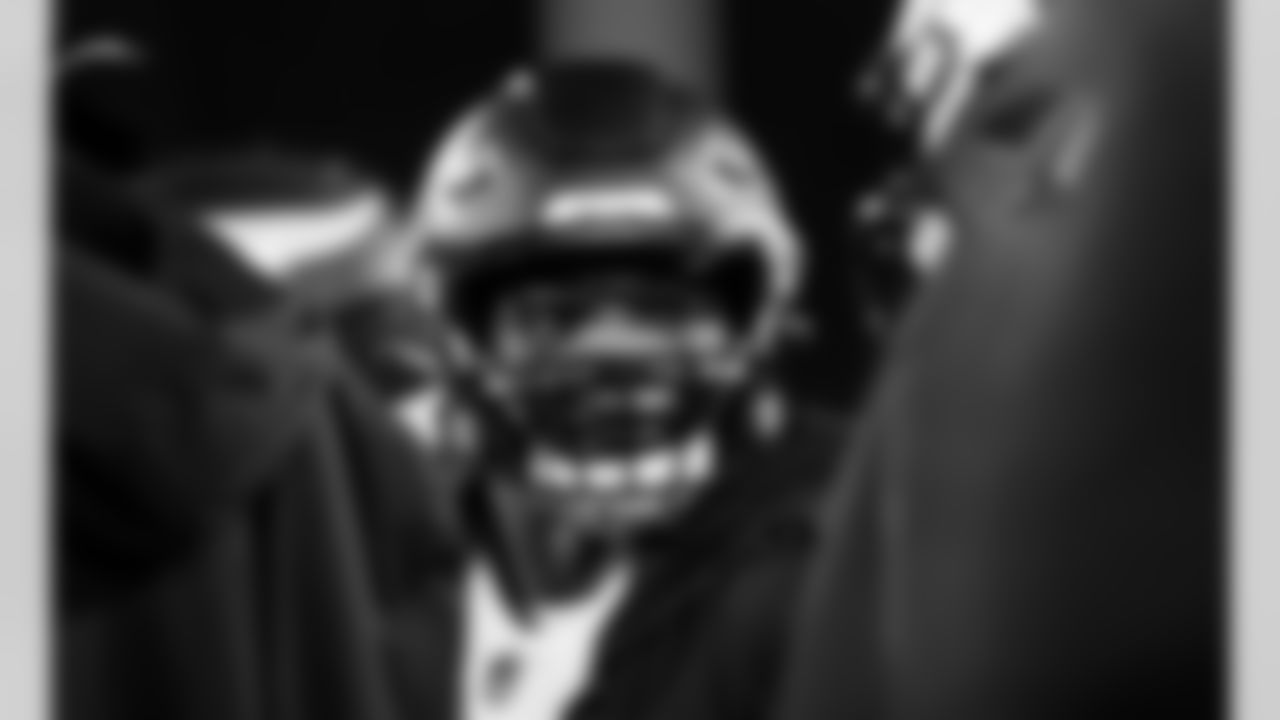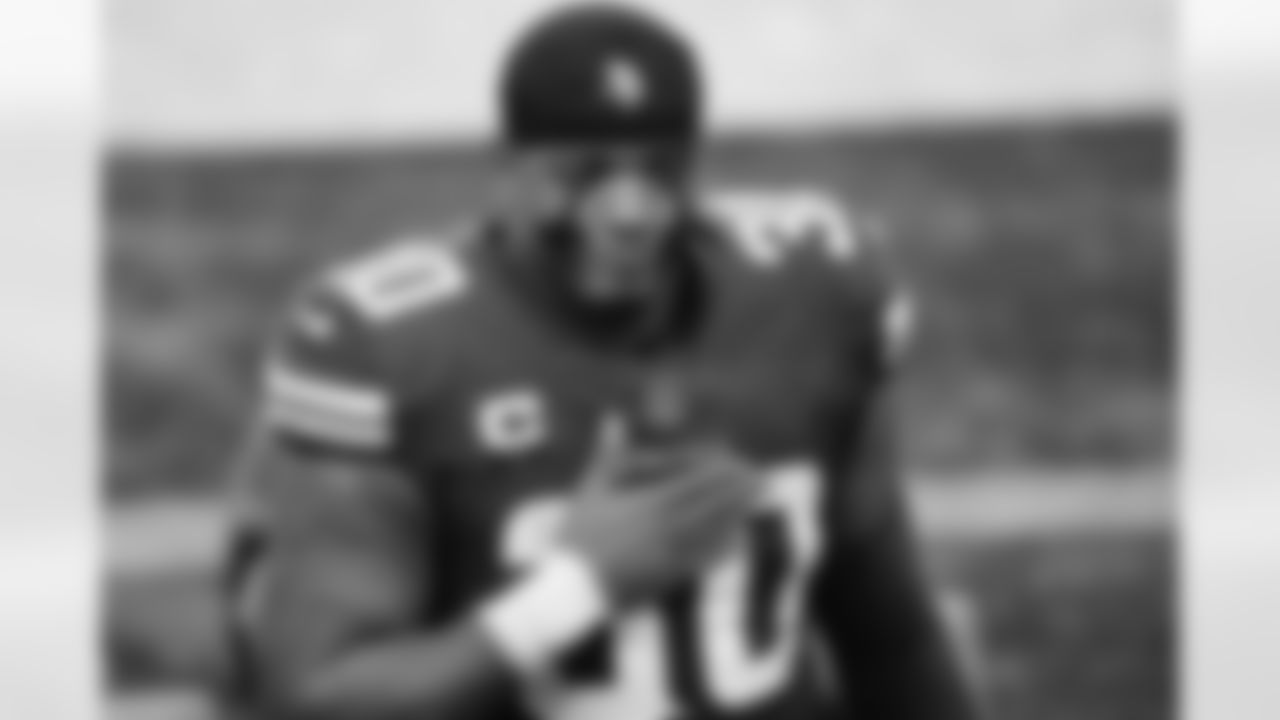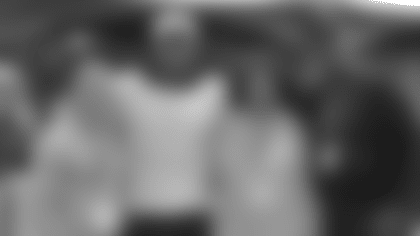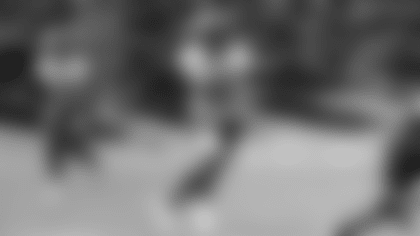By: Lindsey Young
C.J. Ham's view of mental health is much different now than the mindset he held several years ago.
Growing up in Duluth, Minnesota, he simply didn't focus much on the topic.
"It just wasn't very important to me. Yeah, we talked about it in school, but very briefly. It was a part of the curriculum, but it didn't necessarily hit home," C.J. said. "You think about somebody who has issues that don't necessarily pertain to you, so you just sort of overlook them, and you don't really give them much thought."

The Vikings fullback additionally recalled that terms like "mental illness," or specific diagnoses carried with them a negative connotation.
Particularly within the Black community, he noted, family members or acquaintances battling depression, anxiety, bipolar disorder, et cetera, were spoken of differently.
"They're viewed as 'crazy.' That there's 'something wrong with them,' " C.J. said. "So when you see that, when I see that as a young Black man, I'm like, 'Well, I've gotta do everything I can to not be that person. To not be viewed as my peers or my family as crazy."
As discussed in last week's Getting Open segment with Vikings team clinician Brownell Mack, there sometimes is an even greater stigma around mental health among men and, particularly, men of color.
C.J. can speak only from personal experiences but acknowledged that the observation seems accurate.
He pointed to pride as the main culprit in a society that presses men to be leaders without weaknesses or vulnerabilities.

"I think that's one of the reasons why I think men in general don't want to put themselves in that light – because they don't want people to see them in their darkest moments … where they need help," C.J. said.
He added: "And as a Black man, experiencing injustice – from a young age all the way through today – those things weigh on you. When it comes to self-worth and feeling like you're enough, [wondering] if people truly care about who you are."
Finding freedom from the stutter
Those feelings especially hit hard for C.J., who from a young age dealt with a severe stutter.
The speech impediment made clearly communicating difficult; C.J. participated in speech therapy from third grade all the way through his senior year of high school, constantly working to improve the word repetition or interrupted speech.
He experienced regular bullying because of the disability, which brewed anxiety around speaking publicly or even in conversation settings. It led to a "very angry childhood" for C.J., who often got into fights with his tormentors.
"Because of all those things adding up, it really made me afraid to talk to anybody who wasn't close to me," C.J. said. "That was something that stayed with me all the way throughout college – and even still today, I hesitate to say 'yes' to things where I have to talk because of how I sound. Or how I think I sound, or how I was made fun of for it when I was a kid."

Throughout his time at Augustana University in Sioux Falls, South Dakota, C.J. experienced nearly debilitating anxiety ahead of postgame interviews or a class presentation.
"It was to the point where I couldn't sleep," he said. "My stomach would hurt, and I'd start hyperventilating. … And because of what happened to me as a kid, it stayed with me all the way through."
C.J. ultimately reached out for additional support during his senior year at Augustana, working with a student who majored in speech pathology and helped provide additional tools for combatting the stutter.
View the best photos of Vikings FB C.J. Ham from the 2021 season.

FB C.J. Ham

FB C.J. Ham

FB C.J. Ham

FB C.J. Ham

FB C.J. Ham

FB C.J. Ham

FB C.J. Ham

FB C.J. Ham

FB C.J. Ham

FB C.J. Ham

FB C.J. Ham

FB C.J. Ham

FB C.J. Ham

FB C.J. Ham

FB C.J. Ham

FB C.J. Ham

FB C.J. Ham

FB C.J. Ham

FB C.J. Ham

FB C.J. Ham

FB C.J. Ham

FB C.J. Ham

FB C.J. Ham

FB C.J. Ham

FB C.J. Ham

FB C.J. Ham

FB C.J. Ham

FB C.J. Ham

FB C.J. Ham

FB C.J. Ham

FB C.J. Ham

FB C.J. Ham

FB C.J. Ham

FB C.J. Ham

FB C.J. Ham

FB C.J. Ham

FB C.J. Ham
Looking back, C.J. realized he no longer allowed the stutter to define his identity.
"It was something that I let define me for so long, that it just affected my day-to-day; it affected my interactions with other people. And finally when I was able to take hold of that and take over that, I was freed from it," C.J. said. "I think that's a big step for all of us to look at – whatever's going on in your life, whatever you're dealing with, don't let it define who you are. … You are [more] than your mental state. You are [more] than that disability that you may struggle with.
"It has no more power when you get it out of the dark," C.J. continued. "These opportunities kept coming to me to speak in front of thousands of people, or just have interactions with people, and I knew if I said 'no,' it would still have hold of me. … I wouldn't be able to get better; I wouldn't be able to shine a light on it. I think because of me saying 'yes' and working at it, I believe that God is using my weakness to be one of my strongest points in my life.
"Even when you asked me to do this interview, right away my gut's telling me, 'Nah, you can't do it. You can't do it,' " he added. "But I believe when I make that decision – God is gonna lead me through it."
Foundational faith
C.J.'s Christian faith is foundational to his everyday life and has played a significant role in the way he tends to his own mental health and supports others.
He admits freely that his faith has been tested, though, especially when his mother Tina was diagnosed with Stage 4 pancreatic cancer in March 2019. After watching Tina courageously battle the aggressive disease, C.J.'s life shattered when she passed away in May 2020.
Around a year after losing his mom, he found himself in a "really dark place" mentally and emotionally. He cites grief over Tina's passing, along with the heaviness of racial injustice boiling to the surface throughout the Twin Cities, for pulling a bleak cloud over everyday life.
"All those things stacked together. I felt myself becoming not myself … And to be honest with you, that was when I felt like I needed to reach out," C.J. said. "I know some people get to that point and don't seek help, but for me, I was able to seek help and find comfort in talking to somebody about it. That relieved a lot of stress from me, just to be able to vocalize the pain I was feeling.
"But then also my strong faith, my faith background," he added. "Ultimately, my faith is also what's helping me get through this every single day."

That doesn't mean C.J. doesn't still slog through mentally difficult periods. But he is better able to cope with them.
"Being just about two years out from her passing, it's still something I deal with every single morning. When I wake up, it's having that person not be there. That person that I can't speak to while driving to workouts," C.J. said. "So yes, my mental health has struggled in this instance. But I've ultimately come to realize that she's still with me, and I take comfort in that."
For anyone who knows C.J. personally, or even for fans who follow him on his social media accounts, his devout faith is undeniable. He'll also tell you, though, that there are multiple ways in which mental health and spirituality intersect.
"Growing up and often in the church, it's a topic that you say, 'Just pray about it. Just bring it to God, and He'll get you through.' But often times that 'get you through' part [looks] different than we imagine it," C.J. explained. "We hope to wake up and just feel completely normal – and sometimes that is the case. But sometimes God answering your prayer is a longer process. When it comes to seeking help, when it comes to talking to a friend about what you're going through, or it may come to medication – those are all things that I think God still gets credit for.
"He gets credit for the intelligence that these people have. The will, the desire to help people in this realm who need help spiritually and mentally," C.J. added. "He gets credit for all that, and I look at it through that lens. That everything going on around me is because of God, and He has His hand in it all."

Bigger than the football field
"Stick to football."
We've all heard the saying or seen it typed out in a social media comment – a sentiment that professional athletes should show out on the field, court or track and avoid speaking out.
With experts already at work in the fields of mental health and social justice, is it really within an athlete's realm to delve into issues that don't directly relate to his or her sport?
Of course it is. Because athletes are people, too.
"Mental health impacts our well-being, and sometimes that leads to the football field and performing on Sundays. I think it's extremely important that we just continue to shine light on this," C.J. said. "We are football players, we are athletes, but we're so much more than that. God has given me this platform, to where I am right now, to be able to shine light on bigger topics that this world needs to hear and really needs to lean into.
"It's bigger than just the football field. I want all the fans and all the people listening and watching us every single day to think about that," he continued. "And other people go through these same things. They might have a desk job, they might be a teacher, but they're still feeling those pressures."

As C.J. prepares for his sixth NFL season on Minnesota's active roster, he's proud to suit up for the Vikings on game day but equally proud to be part of an organization that takes mental health seriously.
"For so long, it was something that not a lot of people talked about. Especially professional athletes – we're viewed differently. Sometimes we're not viewed as normal humans," C.J. said. "To have professional athletes speak out on this – whether it's talking about something going on in their family, or the effects that fans have on their mental well-being when it comes to competition, I think it's huge. It humanizes us.
"Growing up, we just didn't see light shined on this topic. It was something that was tucked back into our minds," he added. "We all struggle with mental issues, with things that can cripple us. Everybody's on different levels mentally. But to see people who have influence be able to come out and share these things with the world, be vulnerable, that normalizes it. It humanizes us so that when kids [or others] feel this way, they don't feel alone."






